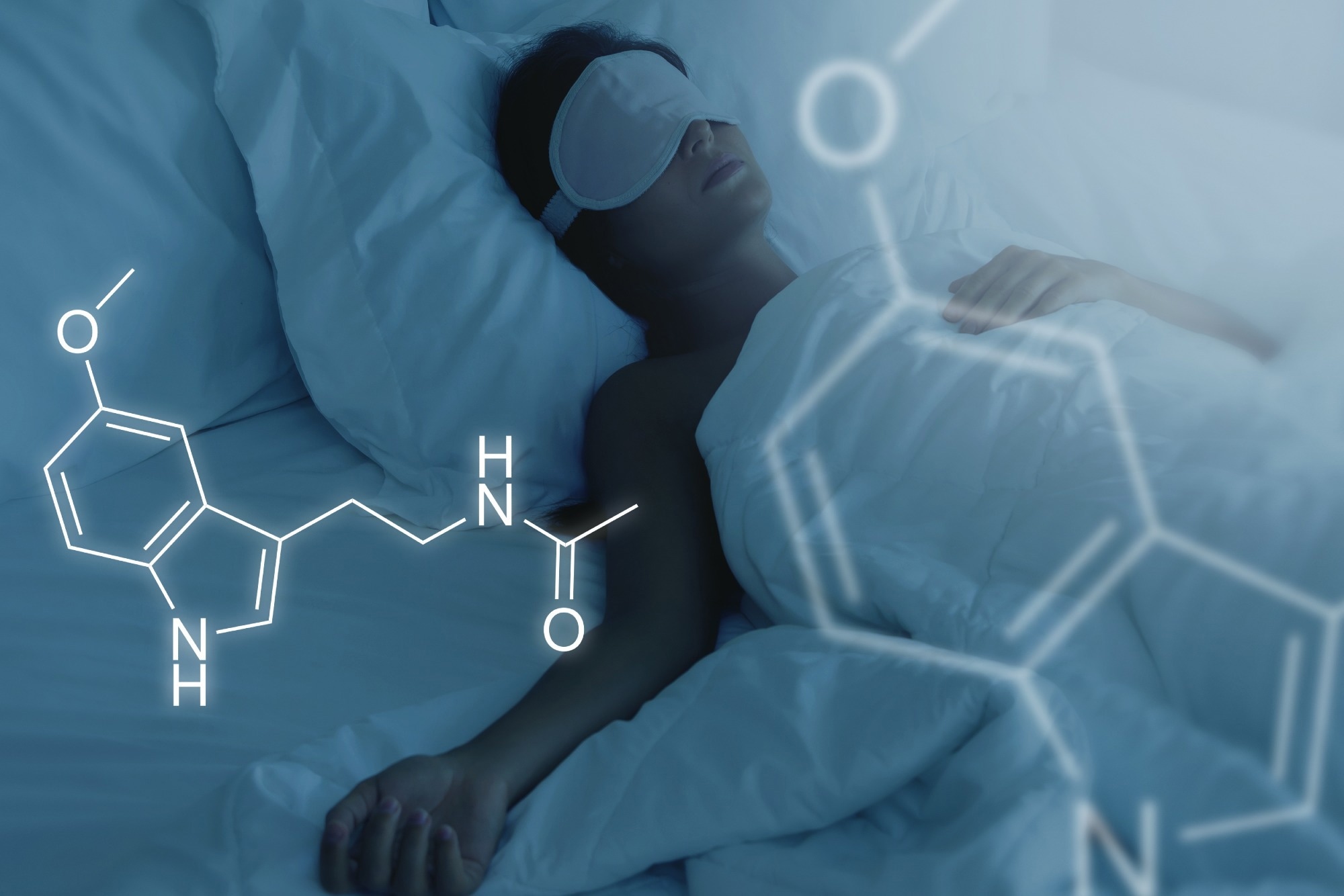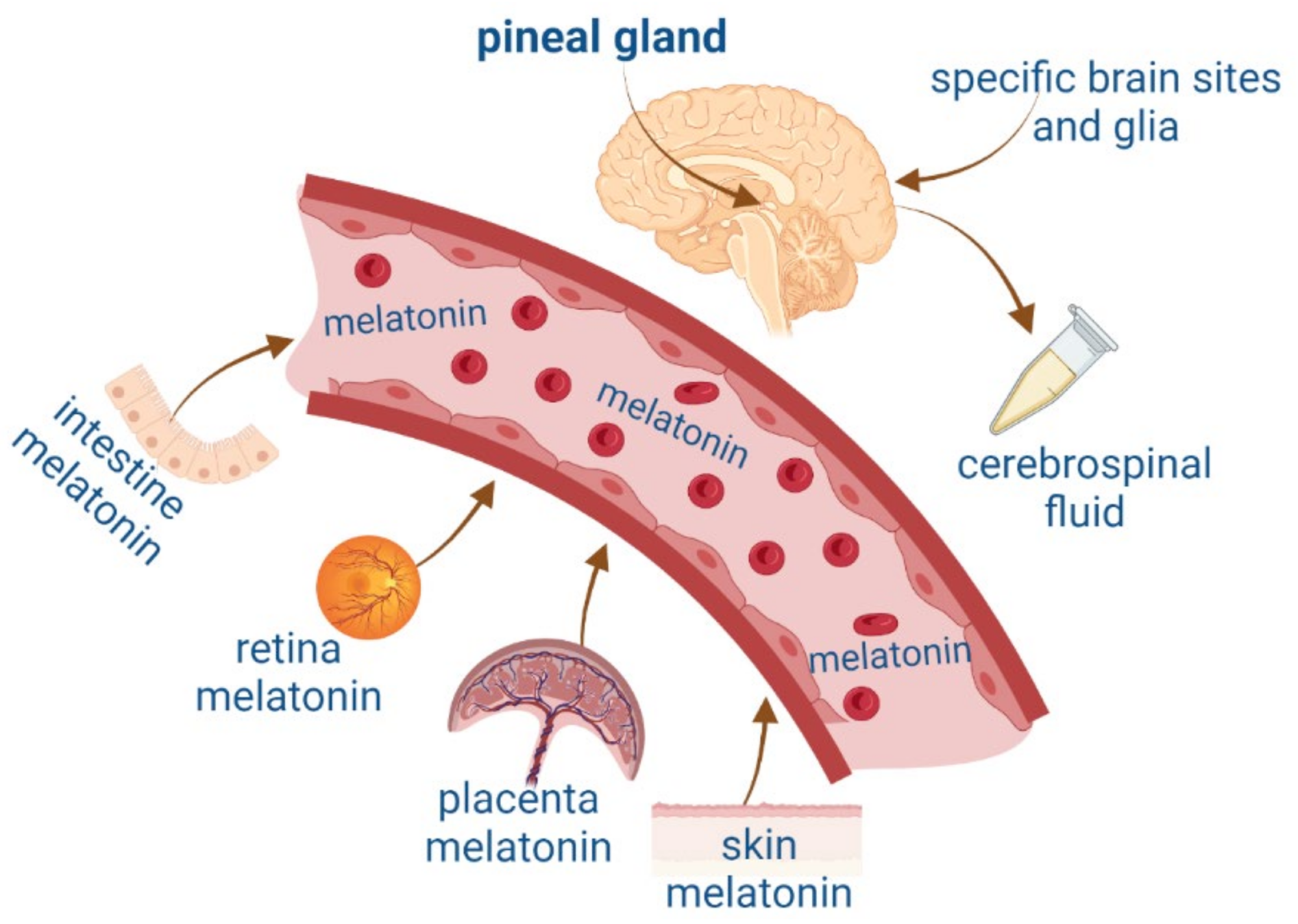Introduction
How is Melatonin Produced?
The Physiological Roles of Melatonin
Melatonin as a Supplement
Potential Side Effects and Risks
Related Video
References
Discover how melatonin orchestrates the body’s internal clock, protects against oxidative stress, and supports overall health, plus what you need to know about supplementation, benefits, and safety risks.
 Image Credit: BLACKDAY / Shutterstock
Image Credit: BLACKDAY / Shutterstock
Introduction
Melatonin is an endogenous hormone widely known for promoting sleep. As a supplement, melatonin is often prescribed for the treatment of insomnia and management of other sleep-related concerns. It is also used to manage post-traumatic brain injuries, jet lag, neurodegenerative disorders, and migraines.
How is Melatonin Produced?
Within the hypothalamus of the brain, the suprachiasmatic nucleus (SCN) functions as the principal circadian pacemaker. As light or darkness is detected by photosensitive ganglion cells within the retina, neuronal projections from these cells reach the SCN to regulate melatonin production by the pineal gland1.
 Melatonin synthesis in the pineal gland and extrapineal sites such as the intestine, retina, placenta, and skin and their blood circulation. Figure created by Biorender.com5.
Melatonin synthesis in the pineal gland and extrapineal sites such as the intestine, retina, placenta, and skin and their blood circulation. Figure created by Biorender.com5.
Serum concentrations of melatonin are typically between 80 and 120 pg/mL at night, peaking between 2:00 and 4:00 A.M. Soon thereafter, melatonin levels will decline to 10–20 pg/mL and remain at this base level for most of the day2.
When darkness has been detected, norepinephrine is released to initiate the enzymatic production of melatonin from tryptophan. Herein, tryptophan hydroxylase converts tryptophan to 5-hydroxytryptophan, which is converted to serotonin. Arylalkylamine N-acetyltransferase subsequently generates N-acetylserotonin that eventually becomes melatonin1.
Melatonin is not stored in the pineal gland but is readily released into the bloodstream and cerebrospinal fluid (CSF) to reach other parts of the central nervous system (CNS) and peripheral organs. During pregnancy, maternal melatonin reaches the fetus and newborn through placental circulation and breastfeeding, respectively, due to the lack of melatonin production that does not begin until three to four months of age.
The Physiological Roles of Melatonin
The release of melatonin at night is quickly followed by the binding of this hormone to melatonin receptors present in the plasma membrane, cytoplasm, and/or nucleolus. The binding of melatonin to its receptor facilitates the ability of this hormone to control the activity of adenylate cyclase, guanylate cyclase, phospholipase C (PLC), calcium, and potassium channels2.
Melatonin regulates circadian rhythms, such as the sleep-wake rhythm, neuroendocrine rhythms, and body temperature cycles.
Melatonin is considered a chronobiotic molecule that ensures the appropriate timing of the central biological clock, which is essential for maintaining the temporal organization of a wide range of biological functions. For example, melatonin regulates blood pressure levels, immune system function, retinal activity, as well as sexual reproduction and maturation3. Other physiological functions of melatonin include detoxification of free radicals, autonomic cardiovascular regulation, and maintaining retinal health.
Melatonin exerts antioxidant activity by directly scavenging both free radicals and their metabolites. Melatonin also activates antioxidative enzymes like glutathione peroxidase, glutathione reductase, superoxide dismutase, and glucose-6-phosphate dehydrogenase to prevent cellular damage that can occur during periods of oxidative stress. The antioxidant effects of melatonin are particularly important within the mitochondria, wherein this hormone protects mitochondrial DNA from mutations and deletions.
Melatonin is also a key regulator of body mass and energy expenditure through its interaction with MT2 receptors in adipose tissue. It also supports bone health by stimulating bone cell proliferation, type I collagen synthesis, and osteoblast cell differentiation.
Melatonin as a Supplement
Disrupted circadian rhythms can lead to a wide range of issues affecting behavior, mood, neurodevelopment, intellectual function, and overall health. To mitigate these issues, melatonin supplementation has often been used to improve sleep by adjusting and maintaining a regular circadian rhythm2. Melatonin supplementation is associated with many other health benefits, including reduced inflammation, blood pressure levels, oxidative stress, and metabolic dysfunction.
Drugs used to treat conditions such as chronic inflammation may have undesirable side effects, while nutraceuticals such as melatonin are known to be beneficial in treating inflammation due to their high safety and tolerability2.
Consuming melatonin-rich foods can also provide health benefits by increasing melatonin serum levels and the antioxidant capacity of this hormone. Pineapples, strawberries, bananas, grapes, and cranberries are considered good fruit sources of melatonin, whereas garlic, cauliflower, mushrooms, radishes, and peppers are vegetables with higher melatonin content2.
Potential Side Effects and Risks
Although melatonin is generally considered safe, its supplementation may cause adverse effects in a small percentage of users. Some potential side effects of melatonin supplementation may include fatigue, headache, nausea, irritability, limb pain, and stomach pain4.
In the United States, melatonin is sold as a dietary supplement, which eliminates the need for these products to be approved by the Food and Drug Administration (FDA). This lack of regulatory oversight often leads to inaccurate labeling of melatonin products, with one recent study reporting that 88% of over-the-counter products included in their analysis were not labeled with the correct melatonin dosage.
Related Video
What is melatonin -- and should you take it to fall asleep? | Sleeping with Science
References
- Cipolla-Neto, J., & Gaspar do Amaral, F. (2018). Melatonin as a Hormone: New Physiological and Clinical Insights. Endocrine Reviews 39(6); 990–1028. doi:10.1210/er.2018-00084, https://academic.oup.com/edrv/article/39/6/990/5094958
- Kamfar, W. W., Khraiwesh, H. M., Ibrahim, M. O., et al. (2024). Comprehensive review of melatonin as a promising nutritional and nutraceutical supplement. Heliyon 10(2). doi:10.1016/j.heliyon.2024.e24266, https://www.sciencedirect.com/science/article/pii/S2405844024002974
- Tordjman, S., Chokron, S., Delorme, R., et al. (2017). Melatonin: Pharmacology, Functions, and Therapeutic Benefits. Current Neuropharmacology 15(3). doi:10.2174/1570159X14666161228122115, https://eurekaselect.com/public/article/80633
- Side effects of melatonin [Online]. Available from: https://www.nhs.uk/medicines/melatonin/side-effects-of-melatonin/.
- D., E., & Ortiz, G. G. (2021). Melatonin: A Neurotrophic Factor? Molecules, 27(22), 7742. doi: 10.3390/molecules27227742, https://www.mdpi.com/1420-3049/27/22/7742
Last Updated: May 19, 2025